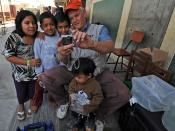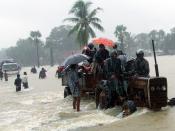In 1648 the Peace of Westphalia effectively ended the rule of the Roman Catholic Church replacing it with a system of legal entities with a permanent population, a well-defined territory and governments capable of exercising sovereignty. The modern sovereign state with a supreme authority to manage internal and external affairs was born. For most of its existence the discipline of International Relations was normally presumed to treat the relations between states, the latter viewed as cohesive social actors driven by their desire for power and prestige. International organizations and other non-state actors were allowed an influence of their own in certain areas, but the state remained in ultimate control. Now IR scholars argue that there has been a transition in the system of sovereignty from the free reign power of the states over their political and economic rule, to a more liberal system that seeks to limit the states authority.
There is a perception that IGO's and NGO's are replacing states as the dominant actors in the international system.` Idealists often present non-state actors as the vanguard of an emerging global civil society, challenging the instinctive authoritarianism of states and the power of international capital. Hard-line realists see them either as front organizations thinly disguising the interests of particular states, or as potential revolutionaries, seeking to undermine national solidarity and stability of the state system ` (Josselin and Wallace, 2001). None of the theories can now deny that the balance of power between states and non-state actors has shifted. The purpose of this essay is to examine whether this shift has declined the authority of the states or left them as the most important actors in world politics? By comparing the state to other actors in IR the essay hopes to answer this question.
States vs. NGO's.
Globalization is transforming...



Bibiliography????
Where is the bib? You cite but without the bibliography it is useless!!!
0 out of 0 people found this comment useful.